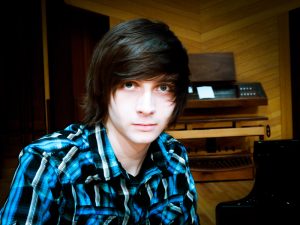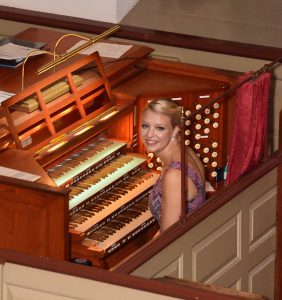Alexander Umfleet and Carina Sturdy were one of four student composer-organist pairs that were selected last fall for the AGO’s 2017 Student Commissioning Project. The project is an exercise in creative partnership over the course of the 2017-18 academic year wherein a composer and an organist are paired to collaborate on the composition and performance of a new work for the organ. Abaddon was premiered February 11, 2017 and performed subsequently twice by Carina Sturdy.
 Tell us a little about Abaddon
Tell us a little about Abaddon
Alex: The piece is the fourth in a series of pieces that I’ve been working on inspired by the imagery of dragons. The others focus on mythological and fantastical depictions of the beasts, but with this one I wanted to target the religious text of the book of Revelation and the 7-headed, 10-horned dragon from Chapter 12. When Carina approached me about writing for the organ, I immediately knew I wanted to play off of the relationship between the organ and religious music while adapting my personal style and ideas to the instrument. My other “dragon” pieces are set for large ensembles, so adapting the complex ideas that fueled those pieces to a solo organ setting proved to be a challenge, but a welcome one.
Had you composed for the organ before?
Alex: No, I had never composed for organ before. Everything was completely new. I approached the project as if writing for an orchestra, while Carina guided me along the way.
What did you learn about the organ?
Alex: There’s so much power that can be wrought from a single player with this instrument, it’s incredible. I learned so much about what was possible, but I still had to keep in mind that I was still writing for just one player. I had so many ideas coming out at once, so keeping track of register and where there were opportunities for timbre changes while still moving the work forward was something I hadn’t considered in this way before.
Why was the organ and not another instrument chosen for Abaddon?
Alex: I felt that the theming of the piece matched well with the instrumentation. I have had the idea of writing a piece inspired by the dragon from the book of Revelation for a while, but didn’t know how I wanted to approach it. I knew I wanted it to be different from my previous work somehow. So, when Carina approached me about this project, my mind immediately went to this idea that I had on the shelf and Abaddon, the Dragon of The End was born.
Did you have significant input from Carina?
Alex: Yes. There was a lot of back-and-forth as we would meet throughout the process. I would bring her sketches that she would sight-read and she would kindly tell me what was and wasn’t physically possible to play. From our first meetings where she introduced me to the instrument and its capabilities, to showing me modern repertoire written for the instrument, and to discussing theming and form, Carina was very much a part of the compositional process.
 Carina, tell us about playing Abbadon.
Carina, tell us about playing Abbadon.
Carina: This piece definitely does have some challenges, some rhythmic, others in smoothly transitioning from one sound to another. I have never seen a piece that required a pedal tremolo before, and I have several shifts that on most organs require bridging keyboards. On the other hand, since the piece has a programmatic element, I find it very easy to express the musical flow of the piece.
Did you know each other well before starting?
We knew of each other and what the other person was generally up to, but not personally. She had heard several of my pieces performed around campus and especially liked my first dragon piece Dra’Kur (an orchestral work). I had heard her perform as part of a weekly Performance Hour the school offers as a class, and had heard of her many collaborations with studios across the school.
Was the project worth the time and effort?
Alex: It absolutely was. I had always been intrigued by the organ but at the same time completely terrified. I had no idea of how to approach it; it seemed so foreign to me. With Carina’s guidance, though, I learned techniques for how to write for it, what to keep in mind, and a bit on how to think of the organ from the perspective of an organ player.
Carina: Working with a composer who didn’t have a background in organ created a wide variety of ideas that I had never seen in organ literature. Tremolos in the pedal to create a sense of instability and foreboding seemed crazy at first, but it creates exactly that sense in the piece. I also found that the cluster chords in the pedals underneath create ostinato figures created a very interesting low rumble and harmonic interference pattern. These new compositional ideas sparked my interest in exploring and experimenting more with what the organ is actually capable of.
Have you made plans for life after graduation?
Alex: I will be pursuing a master’s degree in film music composition from the University of North Carolina School of the Arts while continuing to write concert music, mixing the two styles. I just finished scoring my first film and learned so much from it. I’m excited to continue my education and continue building my portfolio in the future, living in both the concert and film compositional spheres.
Carina: After graduation, I plan to pursue a master’s degree in organ with a focus on sacred music with the goal of becoming a church music director and organist. I also hope to continue collaborating with other musicians and composers to help create more pieces for the organ.


